THE SPARK









The Spark 2025 Vol. 03, Issue 1
Head of School
Tom Ferguson
Editor-in-Chief, Director of PR & Communications
Anne K Choe
Additional photographs provided by Youngsang Cho, Irene Dominguez, Jenny Kim
Design & Printing
Joyful Communications
Publisher Dwight Seoul
The Spark is published semi-annually by Dwight Seoul PR & Communications. Reproduction in whole or in part without permission is explicitly prohibited.
The Spark is distributed free of charge to students, faculty, alumni, and parents of currently enrolled students in a digital format.

“Change is the only constant in life,” wrote the Greek philosopher Heraclitus. In schools, this truth is amplified: we are in the business of growth, learning, and transformation. At Dwight Seoul, embracing change is not just a strategic response to shifting circumstances, it’s a mindset, a habit, and a central part of who we are.
Over the past couple of years, our community has experienced significant evolution. We've grown in numbers, in diversity, and in vision. As we welcome new students, families, and faculty members into our fold, the heartbeat of our school remains constant: to ignite the spark of genius in every child. This mission compels us to continually review and refine our practices, spaces, and systems to meet the changing needs of our learners and the world they’re growing up in.
While school offers structure and support, the world awaiting our students is anything but predictable. As they move into adulthood, they will face what many describe as a VUCA world: one that is Volatile,Uncertain, Complex, and Ambiguous. From climate instability to rapid technological disruption, including the fast-evolving role of artificial intelligence, the future will challenge them to think critically, act ethically, and adapt quickly.
Through our Spark Program, students develop tools to navigate this complexity with resilience and confidence. They learn to reflect, solve problems creatively, communicate with compassion, and make values-based decisions. In doing so, they begin to see change not as a threat, but as a normal and even empowering part of life.
In today’s rapidly shifting global culture, there’s a temptation to adopt every new idea that comes along. At Dwight, we take a more intentional path. We do not embrace every educational trend or innovation simply for the sake of novelty. Instead, we ground our choices in what builds community, what strengthens relationships, and what helps people feel they belong.
One of the most meaningful shifts we are making as a school is in how we understand and cultivate
belonging. Belonging goes beyond access; it’s about creating an environment in which every individual feels seen, valued, and connected. It is a feeling of emotional safety and authentic inclusion that allows students to thrive, take risks, and be themselves.
This year, we have taken concrete steps toward strengthening that foundation. Looking ahead to August, we will begin a new chapter in this journey by working closely with external inclusion specialists who will guide our faculty in understanding how to support a wider range of student needs. But the aim is not simply technical improvement, it is cultural. We are developing our collective ability to build a school where belonging is felt, not just spoken about. Where every student knows: Iamknown,Iamunderstood,andImatterhere.
Belonging doesn’t come from trend adoption, it comes from clarity of purpose and consistency of care. Our students learn this by experience: in classrooms, advisory sessions, and community gatherings where empathy, respect, and collaboration are modelled daily.
A key dimension of belonging is language. Our school serves a richly multilingual community, and it is essential that we recognise the role language plays in identity, confidence, and connection. This year, we engaged expert consultants to lead sustained professional development for faculty focused on languageaware teaching practices. This work is helping us embed support into the curriculum, rather than isolate it, so that students developing English can fully participate in and contribute to every aspect of school life.
This is not a short-term initiative. It’s a commitment to a more inclusive, responsive model of education; one where linguistic diversity is seen not as a challenge to be managed, but as an asset to be celebrated.
Managing change in a school is as much about timing as it is about vision. One of my central responsibilities as Head of School is to ensure that we don’t try to do too much, too fast. Real transformation takes time and thoughtful pacing.
This year, we’ve focused on layering change in a manageable and meaningful way. Our aim is always to build momentum without overwhelming our people. We prioritise sustainability over urgency, and depth over breadth. This approach supports wellbeing, builds trust, and allows each change to embed in the culture, rather than flash and fade.
As we look to the future, we carry Heraclitus’s insight with us: changeistheonlyconstant. But so too is our commitment to thoughtful leadership, community connection, and the deep work of helping students find their place, and purpose, in an unpredictable world. At Dwight, embracing change means leading with heart, staying rooted in our mission, and ensuring that every step forward is taken together.
Warm Regards, Tom Ferguson Head of School


By Serena Geddes Aguilar Lower School Principal, Dwight Seoul Mother of three grown boys
I’ve spent most of my adult life supporting children through change—sometimes gentle, sometimes abrupt—but always inevitable. As an educator, and especially as the Lower School Principal at Dwight School Seoul, I’ve watched young learners face new teachers, new friends, new languages, new countries. As a mother of three grown-up boys, I’ve experienced the home version of this too: the shifting friendships, the emotional weather of adolescence, moving countries, and the transitions from one developmental stage to the next.
But my own journey began long before I held a job title or was an adult. I went to boarding school at the age of eight.

I remember saying goodbye to my parents and dragging my trunk into my dorm. We didn’t have a phone, FaceTime, or weekend visits. What we did have were moments of homesickness, the need to self-soothe, and a community of other children learning—sometimes messily— how to get through hard things. We saw our parents every couple of months.
That experience built my independence, yes, but more importantly, it grew my emotional intelligence. I learned how to read people, make decisions for myself, and navigate uncertainty. I cried, I grew, and I learned how to cope. Those same capacities—coping, connecting, adapting—are what I now work to foster in the students at Dwight.
Our world isn’t just changing; it’s accelerating. Globalization, technology, climate, migration— all these forces shape the lives of our children, whether we like it or not. At Dwight, our students often live between cultures and languages. They say goodbye often. They start over often. And while change can be unsettling, it can also be the greatest teacher—if we help children frame it that way.
What we do know from child development is this: young learners don’t come hardwired to handle change gracefully. They learn to do it through experience, support, and modeling. When we give them tools—language to express feelings, strategies to regulate themselves, the safety of routine paired with the invitation to explore—we teach them that change is not something to fear. It’s something to walk toward with confidence and curiosity—hallmarks of the IB Learner Profile.
Risk-takers, communicators, and reflective thinkers are not born. They are grown through intentional, loving, and scaffolded experiences.
And in this journey, parents are essential partners. You are the consistent presence—the first teachers, the quiet encouragers, the ones who help children make sense of the world when it feels overwhelming.
Confidence is not loud. It’s not brash. In children, it often shows up as a quiet willingness to try, to get it wrong, to get up again. One of the most important ways we build this in young learners is by allowing them to experience age-appropriate struggle.
That may mean not rushing to solve every peer conflict for them. It may mean letting them forget their homework and figure out how to problem-solve. It certainly means praising effort and strategy, not just the end result.
When students take risks and reflect on the outcomes, they begin to see themselves as capable, independent learners—as the principled, balanced individuals we aim to nurture.
At home, I’ve seen how small moments of responsibility—cooking dinner, resolving sibling disputes, navigating their own schedules—have helped my boys become more confident decision-makers. At school, I’ve seen five-year-olds beam with pride when they lead a class meeting or help a friend. These are not small moments. These are the foundations of resilience.
Parents, by stepping back just enough, help children step forward. It’s in the pause, the wait, and the trust that children begin to own their choices and rise to the occasion.
When children face something new, their instinct might be fear or hesitation. But if we can ignite their curiosity, we help them replace fear with wonder. Instead of, “What if I can’t?” they begin to ask, “What might happen if I try?”
This is where the inquiry-based approach we use at Dwight is so powerful. We don’t just hand children information—we encourage them to ask questions, follow their interests, and investigate problems.
When we nurture inquirers who are also knowledgeable, children begin to see change as an adventure rather than a threat. Curiosity gives them a sense of agency. It tells them, “You’renotjustapassengerin thischange.You’reanexplorer.”
Parents can cultivate this at home, too, by making space for wonder—by resisting the urge to provide answers and instead saying, “That’saninterestingquestion.Whatdoyouthink?” When adults show that curiosity is valued, children feel safe to explore.


One of the most important things I’ve learned—both as a mother and a school leader—is that children borrow our calm before they can find their own. The way we react to change teaches them how to respond. If we panic, they panic. If we are grounded and open, they begin to mirror that.
At Dwight, we model caring and open-mindedness, especially in moments of stress or transition. Connection is the constant that helps children feel secure enough to be brave. Whether it’s a morning greeting at the school gate, a bedtime chat, or simply holding space for big feelings, relationships are the safety net that make exploration and resilience possible.
For parents, it’s not about having all the answers. It’s about being present, naming emotions, and helping children reflect. You don’t have to fix the storm—you just need to be the anchor.
We cannot shield children from change. But we can equip them with the mindset, the strategies, and the relationships that help them grow through it. When we help young learners build confidence, curiosity, and a strong sense of self, we’re not just preparing them for the next school year—we’re preparing them for life.
Let’s raise children who are principled risk-takers, caring communicators, and reflective thinkers. Children who meet change not with fear, but with wonder and resilience.
Because change isn’t going anywhere. But with the right support—from parents, educators, and a connected community—neither are our children’s sparks.
By Jennifer Song, Class of 2025

Around this time last year, when I was beginning to stress over college applications, I came across a quote online: “It’s okayto be scared. Being scared means you’re about to do something really, really brave.”
It took me back to my first New Student Orientation at Dwight in 2018, sitting in the auditorium, holding my mom’s hand, feeling that same mix of nervousness and excitement. Coming from a large public school in New York, I wasn’t sure if I’d fit into a small, tight-knit community like Dwight.
But over time, things started to fall in place. I found friends I could be myself around– people who turned five-minute conversations into hour-long ones, those who made lunch on the small field something I genuinely looked forward to every day.
Dwight gave me opportunities I never imagined. In 11th grade, I flew to Dubai for the Global Music Festival. Even though it was my fifth time participating, it still felt surreal. I had never been to
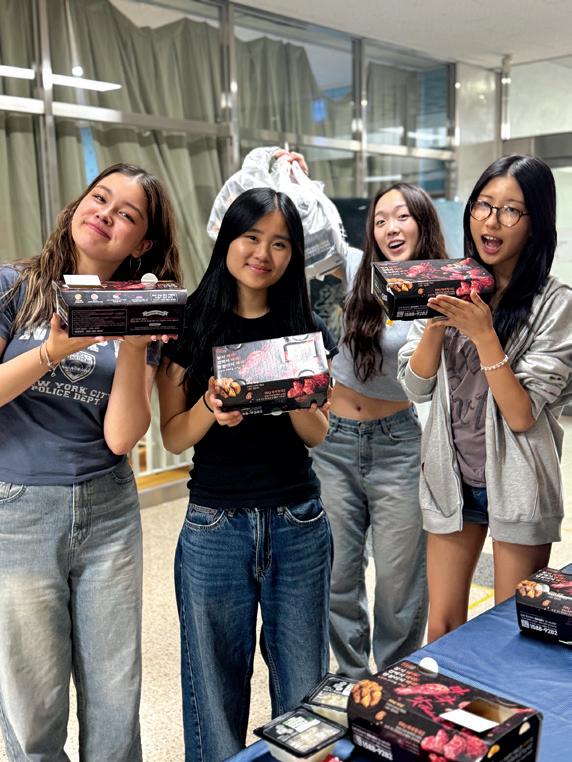

Dubai before, and standing on stage halfway across the world, performing with students from so many different countries, I felt the kind of connection that only music can create. It was both humbling and unforgettable.

During the Week Without Walls trip in 2023, I helped organize a medical screening in a small village called Les in Bali as part of MedCo. It was hot, humid, and hectic– but it was also one of the most meaningful things I’ve ever been part of.



It made me realize that medicine isn’t just about treatment; it’s about access, awareness, and trust. saw firsthand how many villagers were unaware of the help available to them, or hesitant to seek it out. In some cases, it wasn’t just distance or resources that kept people away. Rather, it was the idea that healthcare was something distant, expensive, or even intimidating.
It shocked me how much healthcare is still tied to prestige and how it can feel inaccessible, reserved for a different kind of person in a different kind of place. This experience made me want to help dissolve that barrier. I’ve always wanted to be a doctor but never knew exactly why. But seeing how easily people can be excluded from care in Les made me realize I want to study medicine to help reshape how care is delivered, so it becomes more human and welcoming to everyone.

As graduation approaches in just a few days, I’m reminded of last year during the Class of 2024’s ceremony, when a bunch of teachers came up to my friends and me, saying, “You’re next!” We all laughed it off at the time. But now, it’s actually our turn, and it’s

wild how close it suddenly feels.
In another universe, I’m still sitting on the small field, in a circle with my friends, laughing as we tear into our lunches. But in this one, we’re all scattering– off to the U.S., Canada, Australia, Hong Kong, the Netherlands, and Japan. It makes me a little sentimental knowing we’ll be so far apart. But I’m also proud that I’ll always have someone in another part of the world I can call up at any time.

I’ll be back in New York this August for college, and with the move just a couple of months away, I’m starting to feel that same nervousness I had on my first day at Dwight.
Maybe being scared really does mean I’mabouttodosomethingbrave.
Change is here again– and I think I’m ready.
By Becky Bowman, Grade 1 Parent

I have not, historically, been someone who signs up to help lead things.
I was a journalist. I’d rather watch, listen, and observe from the sidelines, ask questions to get any details I can’t see, and write up what I’ve found out so that others can understand or experience it. I was taught not to interfere or involve myself in whatever is happening.
I was a product sales lead. I liked being behind the scenes, gathering needs from stakeholders, organizing a to-do list and setting goals so we could all complete our mission together.
I am a copywriter. I’ll happily draft an email or a social media post to advertise an event. I might even create a poster or a flyer.
But — be at the front of the meeting, trying to gather and deploy volunteers? Take questions from prospective parents? Be in the room where it happens, as the Hamilton song goes,
for decisions about if or how an event should be held?
Until this past fall, I would have said no.
When my son started at Dwight Seoul in August, I knew I wanted to be involved at school. I raised my hand to be secretary for the Parent Association’s board. But life had other plans.
I soon learned that there weren’t enough volunteers for all of the board’s roles. Was I willing to do something different? What about vice president?
Change is not my happy place. I thrive on ritual and routine, on working in areas I already know and have confidence about. I know communications. Vice president roles are for — well, other people. People who always know what to say, always dress the part and always show up on time.



(Insider secret: Comms work can often be completed from home, in sweatpants. It’s great.)
One thing I’ve learned in the past few years, though, is that the Steve Jobs quote is pretty spot on: that, essentially, the world is run and influenced by people who are “no smarter than you,” than any of us reading these words. So I said yes.
The past eight months have proven me both right and wrong about change. Yes, I did have to show up in person more often. Yes, it was often an uncomfortable role for me. I did not like being one of the few sometimes tasked with important decisions. I did not like having my name be the one attached to importantemails, instead of just writing them.
On the other hand: I have loved working with both the amazing people on our PA board and the school’s devoted, go-to volunteers. I am regularly amazed by the lengths and depths that
committed parents will go to in order to support not only their children but all Dwight Seoul students.
As it turns out, leadership roles are sometimes filled by ordinary people with extraordinary spirits. I’ve been lucky to serve alongside them.
I’m happy, in this school year, to have stretched my own definition of what I can do. I might not have enjoyed being pulled in various directions or disappointed with an outcome or frustrated by not knowing how to solve a problem. But I’ve learned that I can tackle those challenges, that I can take on a role that moves me out of my comfort zone.
I’ll be able to take those lessons with me to whatever roles lie ahead. Maybe, in the future, I’ll even sign up to lead things on purpose.
By Anne Choe Director of PR & Communications
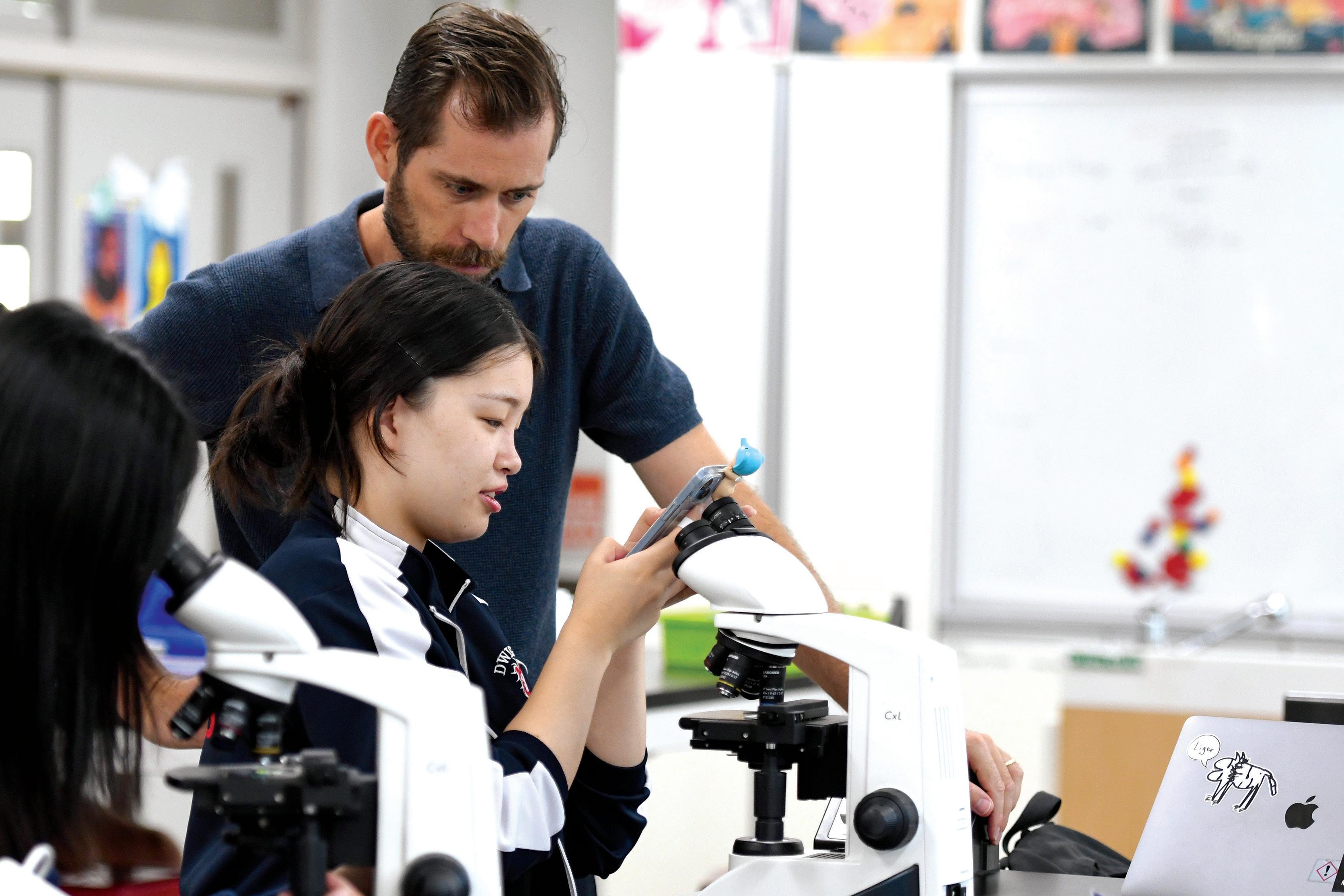
At Dwight Seoul, artificial intelligence is being embraced as a powerful tool for enhancing teaching and learning, used thoughtfully and ethically across divisions. From university counseling to Makerspace, our students and teachers are engaging with AI in ways that reflect both innovation and responsibility.
“It’s not about shortcuts,” says Alexis Ahn, MYP Design Teacher, “It’s about stretching our imagination.”
In Upper School, students use AI tools like College Genie and ChatGPT to support their university search. These tools help narrow choices and prepare students for more focused discussions with counselors. In MYP Design, students use AI to simulate interviews, roleplay
user feedback, and generate product names, fueling creativity and deeper thinking.
Lower School students are also exploring AI in age-appropriate, creative ways. In Library and Makerspace classes, they use Canva for digital art, Suno to create original songs, and School AI for guided, safe interactions. These experiences foster early digital literacy while reinforcing critical thinking skills.
Teachers use AI to streamline lesson planning and adapt materials for diverse learners, including EAL(English as Additional Language) and Quest students. AI helps generate personalized learning paths, interactive activities, and vocabulary lists, freeing up time for deeper inquiry and student engagement.




Equally important is the ethical lens through which AI is used. Faculty model responsible AI use by incorporating evaluation tools like the CRAAP (Currency, Relevance, Authority, Accuracy, and Purpose) test, encouraging students to be thoughtful and discerning. The IB’s AI guide also helps ensure our practices align with global standards and our values as an IB World School.
Stephanne Siberry, Librarian Teacher, says, “It is an exciting learning adventure empowering Dwight Seoul’s students with AI! We’re creatively using
tools while fostering crucial ethical awareness and critical thinking. This dynamic field, supported by the IB”s AI guidance, allows me to cultivate positive skepticism and open-mindedness in our young researchers a thrill for us all.”
At Dwight Seoul, AI is not a shortcut it’s a catalyst for exploration and growth. With a network-wide commitment to thoughtful policy and innovation, we are proud to be leaders in shaping how AI supports education in a global, interconnected world.
By Anne Choe
Originally published in AMCHAM Quarterly Journal, May 2025
Since its founding in 2012, Dwight Seoul has honored UN International Mother Language Day to highlight the importance of multilingualism in education and its broader impact on global competency. Embracing linguistic diversity strengthens cultural identity, enhances awareness, and develops essential skills for success in an interconnected world.
In international education and the global business landscape, English serves as a common medium. However, genuine global leaders understand that language is more than a tool—it is a bridge to cultural fluency, market insight, and collaboration. Studies indicate that strong proficiency in one’s mother tongue boosts cognitive function, enhances problem-solving abilities, and cultivates adaptability— key attributes that drive innovation and global engagement.


On February 21, the UN-recognized date for Mother Language Day, Dwight Seoul parents read to lower school students in 12 languages, sharing their unique cultures and traditions. Watching students’ faces brighten as they recognized the familiar sounds of their home language underscored the power of linguistic diversity—not only in personal identity, but also shaping individuals who are prepared to thrive in a multicultural society and workplace.
At Dwight, we believe celebrating multilingualism nurtures global citizens who respect and appreciate diverse cultures. Encouraging students to embrace their mother languages fosters pride in their heritage while equipping them with skills critical for international business and diplomacy. A society that values all languages promotes inclusivity, understanding, and stronger global partnerships.
UN International Mother Language Day serves as an important reminder: while we may communicate in a shared language, every language matters. As we navigate an evolving global economy, supporting linguistic diversity is not just a cultural responsibility—it is a strategic advantage for future leaders.




By Kaleena Carter, Director of UCC

Change is not a foreign concept to international school students. Each year brings shifts in their school environment. From new teachers, changing friend groups, and evolving routines, these constant adjustments create a rhythm of newness they must continually learn to embrace. Developing the ability to pivot and accept change as the norm is a key factor in building resilience, a characteristic increasingly recognized in college admissions.
Ironically enough, some students become paralyzed by the constant change and, in response, anchor themselves in rigid decisionmaking, planning out their next four years of high school without considering the inevitability of change. Perhaps it is due to the nature of the IB, where students must choose courses for the last two years of high school, that this mindset of “having all the answers” starts to generate.
To counter this rigidity, our Grade 9 UCC curriculum is intentionally designed to cultivate flexibility and reflection. When counseling our younger students, I avoid leading with questions about what they want to major in or which universities they hope to attend. Instead, I ask
what currently interests them and what they’re passionate about. The UCC journey is more about exploration and pivoting with a purpose rather than focusing on the goals of university and career pathways. Our Grade 9 program encourages students to explore their passions, reflect on their values, and demonstrate them through extracurricular activities and passion projects. Luckily, the IB allows them to connect these elements across their years in the IB via personal projects, service as action, CAS, and extended essays. The goal is to encourage our students to regularly harness opportunities to explore, which will better inform their purpose. If anything, I want to remind students that you do not have to wait to have all your ducks in a row or even an agenda to address when you come into my office. It’s not about having all the answers when you walk through the door but about bringing openness and vulnerability. I can then help students navigate how they can develop through their interests and values, which will naturally lead to more confidence in a path they can initially pursue.

I want students to focus on the “why” behind what they're doing and to reflect on the “how” of their actions. The best solutions, ideas, epiphanies, and brainstorming sessions I’ve had with students often happen in the final five minutes of our 25-minute conversations.
It takes time to connect and the courage to embrace change.
Within the counseling profession, we, too, must adapt to change, especially in the rapidly evolving landscape of university admissions. From shifting testing policies to fluctuating international student caps, staying current is essential. But more than that, each graduating class brings its own rhythm and story, with each individual’s perspective and resilience reminding me why I remain passionate about walking alongside them through every step of their high school journey.
By inspiring impact and change through Simon Sinek's Golden Circle, a typical 1:1 session with a student is infused with a lot of questioning, with a focus on me asking, “Why?”. It’s a question that was never really asked of me, back when I was firmly rooted in my decision to study veterinary science from Grade 9. In hindsight, my ‘helper’ trait was misdirected, drawn to the veterinary science field due to my natural affinity for the sciences rather than from a deeper sense of purpose.
Matthew Jang Class of 2015

As one of the very first graduates of Dwight Seoul in 2015, what was it like helping shape the school’s culture from the ground up?
Being one of the first grads at Dwight Seoul was kind of wild, but in a good way. Since everything was just starting out, we had a lot of freedom to try things, start traditions, and figure out what kind of school culture we wanted to have. It was cool knowing that some of the stuff we helped kick off might still be part of the school today. Looking back, it was a mix of a lot of trial and error, but also a lot of fun.
Looking back, were there particular teachers, projects, or moments at Dwight that sparked your interest in design, technology, or innovation?
One of the first moments that got me into design and creative thinking was during a drama class with Mrs. Vicki Gardner in Dwight. We had to write a script about our inner child, and it was the first time to bring a story to life. Later on, when I started my job here in the Makerspace, it honestly felt kind of similar. You build something physical to solve a problem or bring an idea to life. Both are creative, hands-on, and all about figuring things out as you go.
After graduating, what path did you pursue? And did you ever imagine you’d find yourself back here, working with students in Makerspace?
After graduation, I started taking classes about joinery with hand tools to pursue my dream as a woodworker. During that time, my brother was in his senior year, so I was driving him to school during his IB exam. That is when I got the opportunity to start working in the Makerspace since it was a brand new subject that Dwight had just started. Now I get to work with students, support their ideas, and help them bring their design to life and honestly, it’s been such a rewarding experience.
Now that you’re on the other side, what has surprised you most about today’s Dwight students or how the school has evolved?
Now that I’m on the other side, I think what’s surprised me most about today’s Dwight students is just how much more attention there is on well-being and giving students the freedom to really explore that excites them. There’s this energy on campus that feels super open, like students are encouraged to follow their curiosity, try new things, and take creative risks without so much pressure to be perfect. Everyone just seems more excited to be here, and that kind of vibe makes a big difference.
You’re supporting all kinds of student projects in the Makerspace. What’s one that really impressed you recently, and what did it teach you about the way students think today?
One project that really stood out to me the most was the Grade 3 Innovation Project where one of the groups decided to make a book cart for the library. It was such a simple idea, but very thoughtful. They noticed that it can be hard to carry a big stack of books, especially for younger kids or even teachers. What I loved was how they saw a small problem and just decided to fix it. It also showed me how students today are always thinking about how to help others and make things better, and they are not afraid to jump in and try something creative to do it.

You’ve
experienced Dwight as both a student and now as a mentor. What do you think makes this community unique, and what advice would you give students about making the most of it before they graduate?
What I’ve always loved about Dwight is just how welcoming the community is. When I was a student, it felt like a place where you could really be yourself, whether you are into sports, art, robotics, or anything in between. And now, being here as a mentor, I get to see that same environment from a new perspective. It’s amazing to watch students grow, teachers going out of their way to support individual passions, and the way the whole community celebrates creativity and effort just as much as results.
If I were giving advice to students, I’d say, ENJOY IT. Seriously, have fun, try new things, and don’t stress too much about always getting it “right.” Dwight gives you so many opportunities to explore what you love, so take advantage of that. Join a club, start a project, talk to someone new. Time goes really fast, and some of the best memories come from just enjoying the ride.

By Wilbert Kwakkel, Student Life Coordinator

At Dwight Seoul, Belonging, Justice, Equity, Diversity, and Inclusion, ‘BJEDI’, are not just principles we talk about; they are values we actively live out. Over the past year, our school community has continued to make improvements to embed BJEDI into every aspect of school life. Through our SPARK program, monthly International Mindedness themes such as neurodiversity, gender equity, and cultural awareness guided lessons, assemblies, and student-led initiatives. One of the most impactful moments of the year was our full-school BJEDI Day, Living It Out Loud, where students engaged in workshops, discussions, and creative projects that celebrated identity, diversity, challenged bias, and promoted empathy.
This initiative has empowered students to take ownership of their learning and leadership. From presenting on gender equity at the Seoul International Women’s Association (SIWA), to organizing kindness campaigns and inclusive House
challenges, students across all grade levels have played a central role in making our BJEDI values visible and actionable.
Faculty and families joined the journey too, through workshops, curriculum shifts, and open conversations about justice, inclusion, and belonging in education.
We are proud that this collective effort was recognized by the British Chamber of Commerce Korea (BCCK) with the inaugural Responsible Business of the Year Award. The award celebrates our school’s leadership in advancing equity and inclusion in meaningful, measurable ways. It is a reflection of our students’ voices, our educators’ dedication, and our community’s commitment to shaping a more compassionate, inclusive future.
Alumni Reunion
June 13, 2025
Mondrian Seoul Itaewon

The official launch of our Office of Alumni Relations & Advancement last December marked a significant milestone that represents our unwavering commitment to staying connected with the remarkable graduates who make Dwight Seoul so special. On June 13, we gathered to celebrate the incredibly accomplished students, inspiring teachers, and dedicated administrators who work tirelessly to create an environment where excellence thrives. Our reunion brought together graduates from Class of 2015 through the Class of 2025 - a full decade of achievement,

growth, and boundless potential. We extend our heartfelt gratitude to each graduate, the parents who supported their journeys every step of the way, and the faculty members who believed in them and lifted them up when it mattered most. We are truly proud to be part of this extraordinary community and excited about the meaningful connections we will continue to build together through our growing alumni network.
Reach out to dwightalumni@dwight.or.kr for more information.

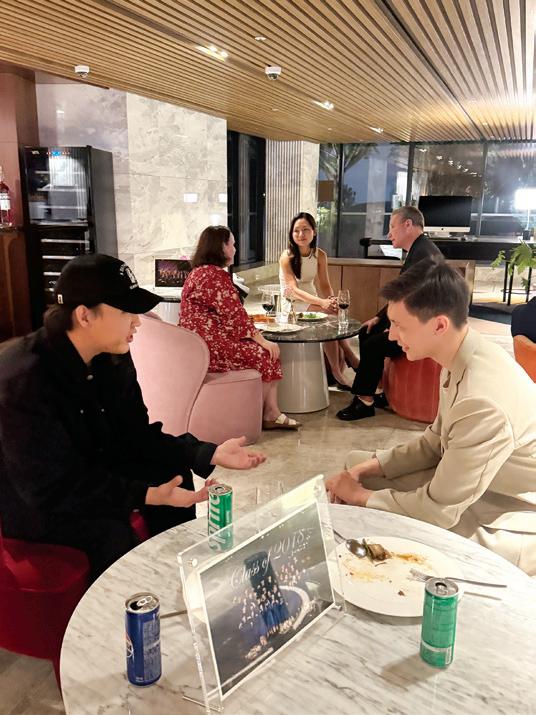


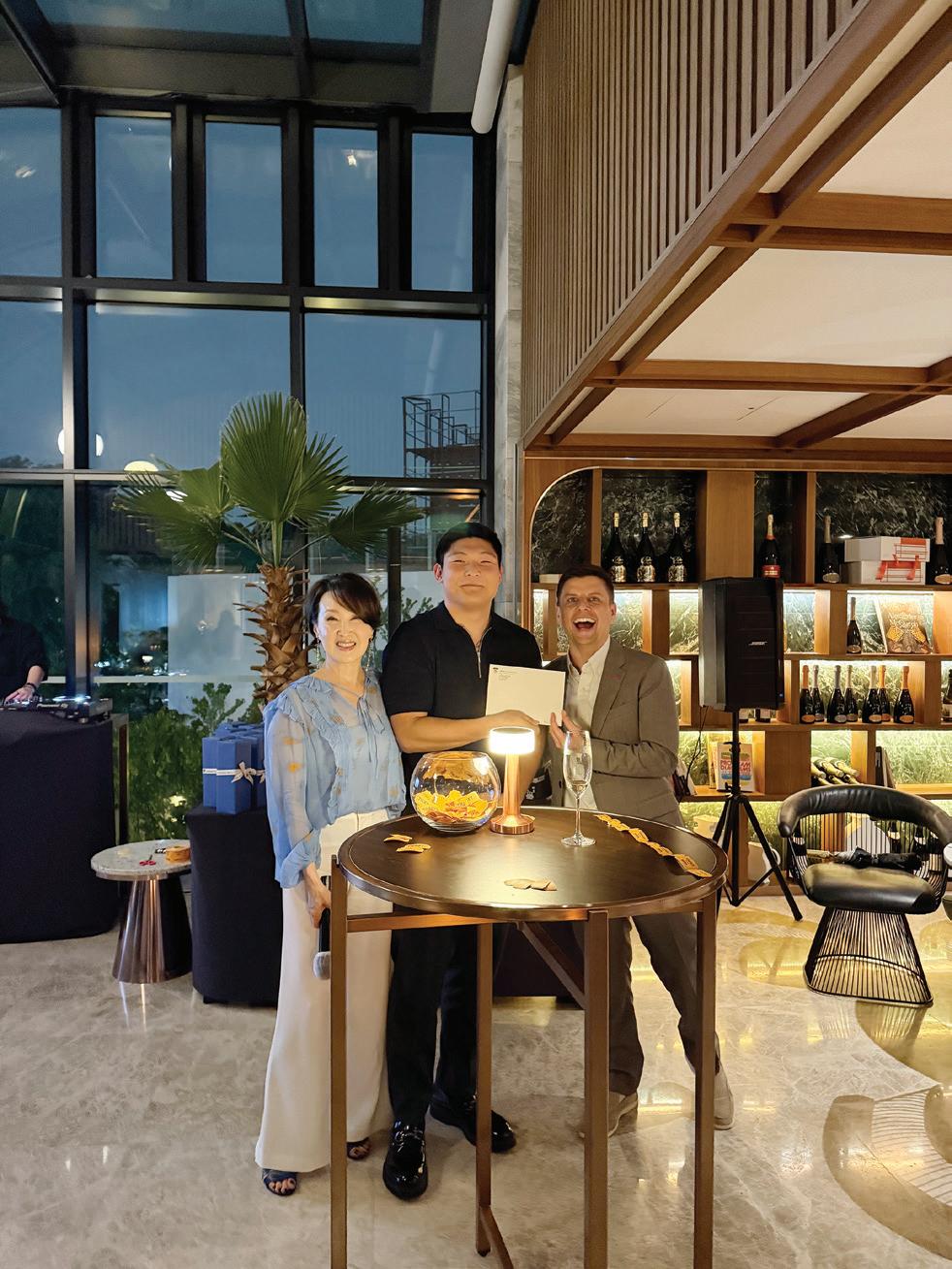





Our annual Dwight Night brought together families, faculty, and friends for an unforgettable evening of community spirit. Organized by our dedicated Parent Association, the event featured delicious food, live music, and plenty of dancing as our school community came together to celebrate what makes us special. The night was filled with laughter, conversation, and the kind of connection that strengthens the bonds between all members of our Dwight family. Thank you to everyone who attended and to our Parent Association for creating such a wonderful opportunity to unite our community in friendship.
You can enjoy photos here.

On May 17, our community came together for this year’s Community Day – a scaled-down version of our annual International Spring Fair due to first floor renovations – organized with dedication by our Parent Association. Under beautiful skies, families and friends celebrated the rich tapestry of culture and languages that make our community so special, with tables overflowing with aromatic dishes from around the world and fun-filled activities that had children and adults alike laughing and playing together. What made this day truly magical was witnessing how our diverse backgrounds
became a source of celebration and strengths, as children who speak different languages at home played seamlessly together while adults exchanged recipes, shared stories, and formed new friendships across cultural lines. correction: None of this would have been possible without the countless volunteers who gave their time and hearts to make the day a success, and as we look forward to next year’s gathering, we carry with us heartfelt gratitude for our Parent Association, dedicated volunteers, and every family who brought their unique flavor to our beautiful community celebration.
A picture is worth a thousand words, and these snapshots capture the vibrant spirit of our school community at Dwight Seoul. From our talented performers bringing Shakespeare’s Romeo and Juliet to life on stage to our competitive e-sports club members and innovative Grade 3 inventors, these moments capture the breadth of student life at Dwight. Whether exploring future careers on Career Day, participating in the beautiful Orchid Light Festival or embarking on an incredible journey to New York City to collaborate with Dwight Schools from around the globe for a performance at the prestigious Jazz at Lincoln Center, these activities showcase how learning extends across our campus and beyond.


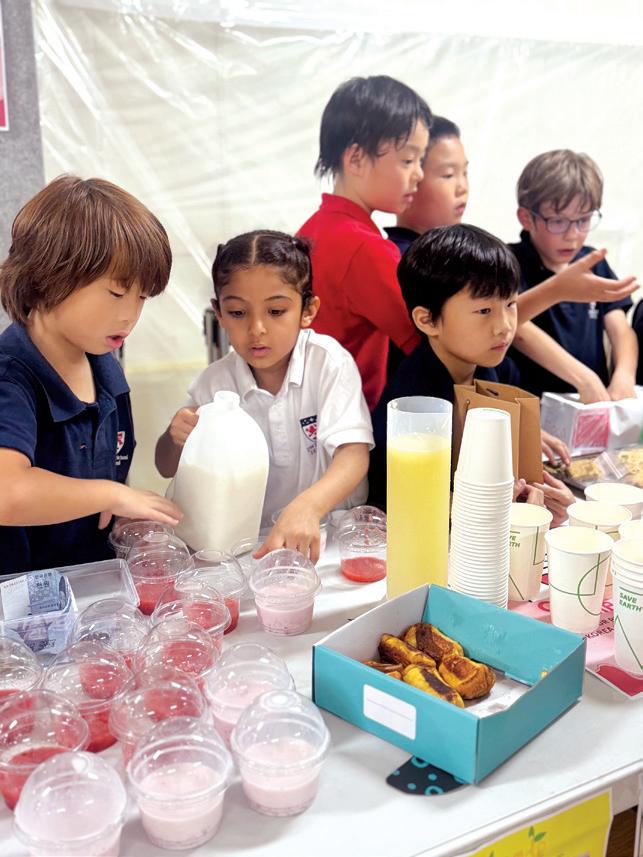









Dwight Schools 3rd Annual Sparkathon brought together over 100 design students from across the global Dwight network, forming 34 teams in a spirited competition of creativity, problem-solving, and collaboration. We are proud to share that Dwight Seoul’s own team, The Kimchee Boys, received the prestigious Most Innovative Award for their outstanding work in addressing challenges in food security and agricultural sustainability.
Congratulations to team members Roi Kang ’30, Hugh Mitchell ’30, Hoeyon Bae ’30, and Chanbin Song ’30 for their forward-thinking approach to a critical but often overlooked issue: soil asphyxiation—a condition that can reduce crop yields by as much as 50% worldwide.
Their award-winning concept features a swarm of soft, worm-like robots that autonomously travel through underground soil systems to:
• Detect compacted soil using advanced sensing technologies
• Remediate soil health with targeted micro-vibrations
• Release essential nutrients directly to root zones
• Offer real-time data monitoring and analytics
This innovative solution stands out for its integration of robotics, user-centered designs, and scalability, providing a low-maintenance, accessible tool to support farmers and address a notable gap in current agricultural technologies.
The team’s success exemplifies the power of interdisciplinary thinking and studentdriven innovation in tackling real-world problems. We are proud to see our students at the forefront of sustainable agricultural technology.


Ella Park, Class of 2025
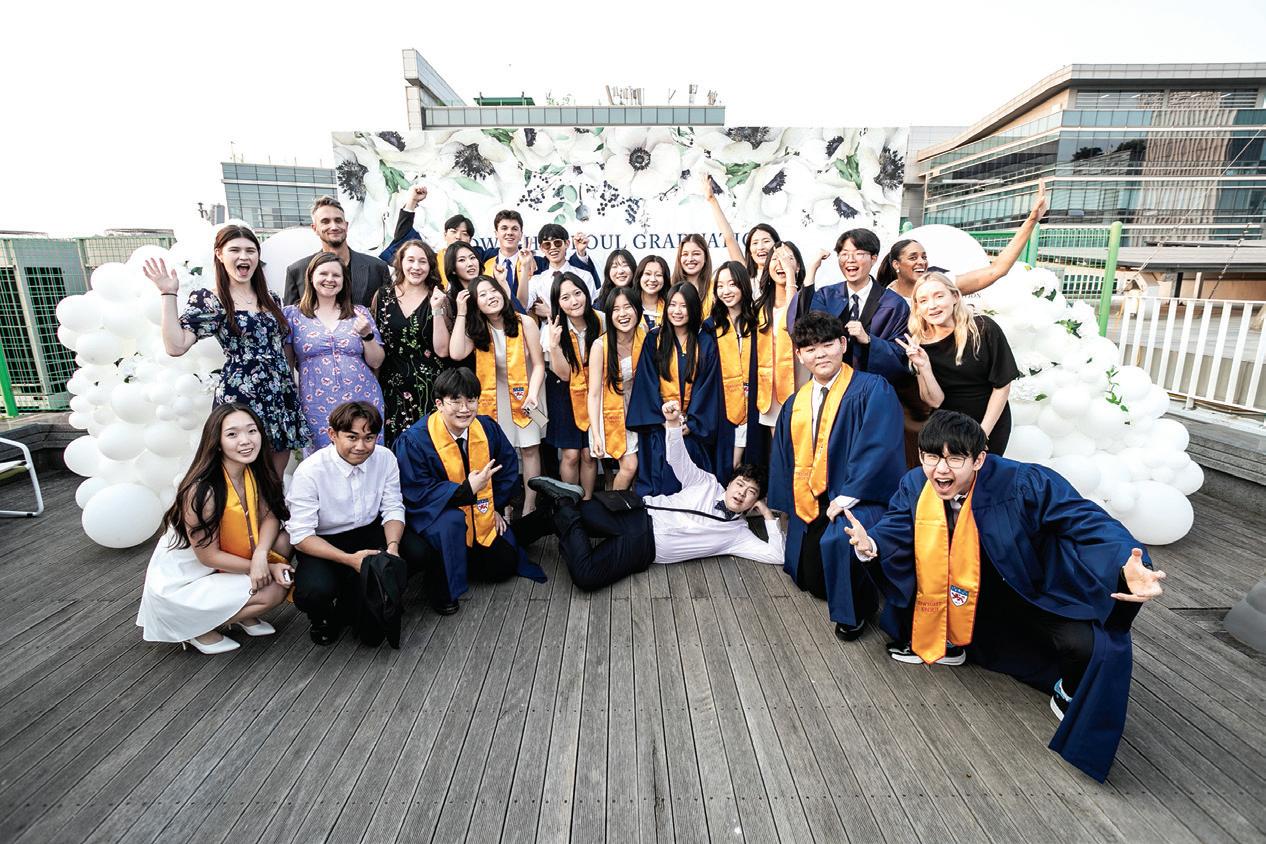
One of my favorite memories at Dwight is the Week Without Walls trip to Bali, where I learned to surf. At first, I fought the waves—pushing my board down with all my weight to stay grounded. But each new wave knocked me over, leaving me sore and slow to progress. It wasn’t until I let my legs loosen up and follow the curves of the water that I finally moved forward—with ease, with flow.


That's what I take away from that trip, and from my 12 years of schooling: to enjoy where the current takes me without fear. From country to country, school to school, my path has never been straight—but every bend brought new friendships, new understandings, new ways of seeing. I haven't found one fixed place in the world to thrive, but learned to move through it with openness, resilience, curiosity, and most importantly, a smile, a laugh!
So to the Class of 2025:The next wave is coming—let’s haveablastridingit.


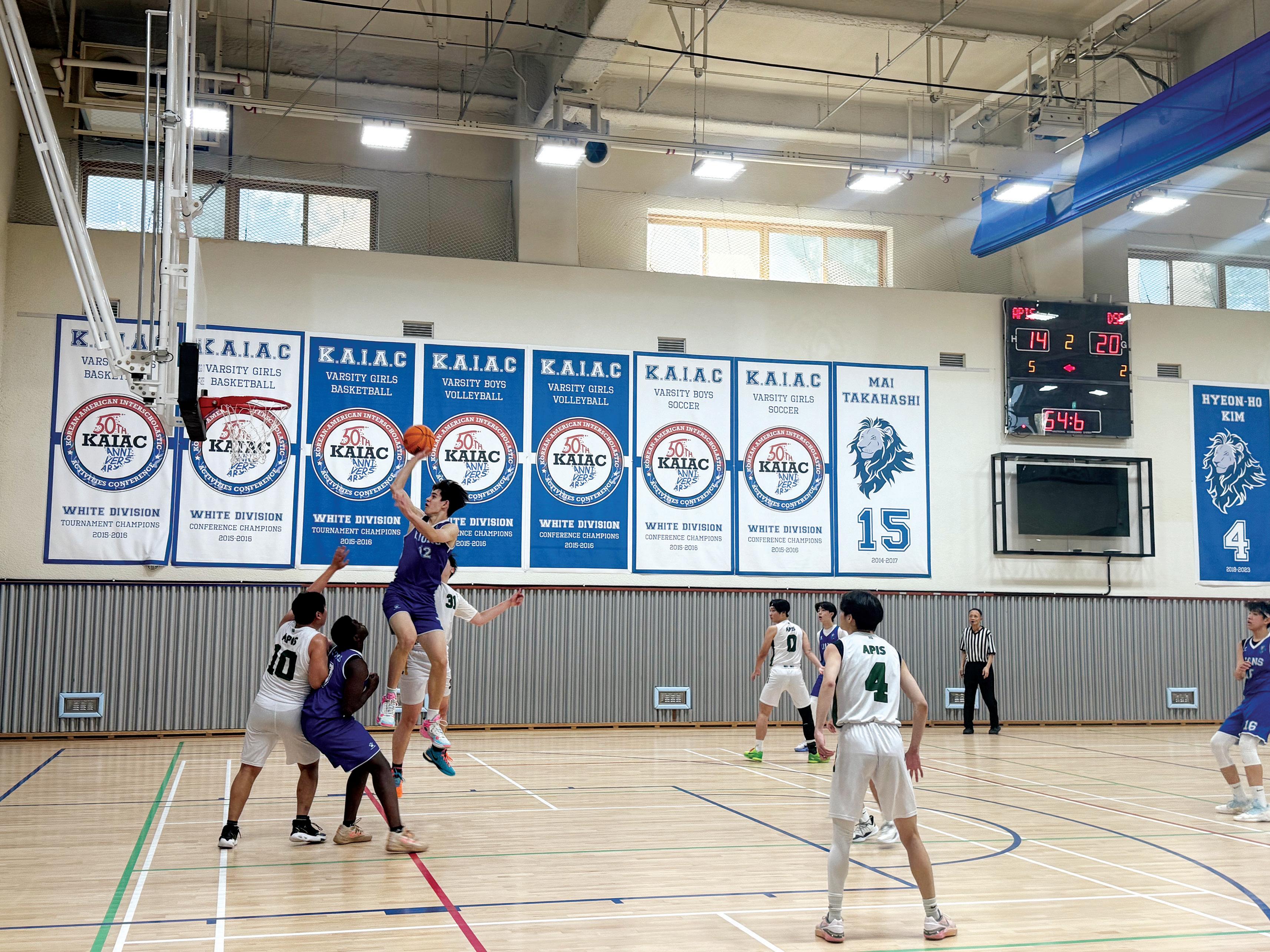
Dwight Seoul
21, World Cup, Buk-ro 62-gil, Mapo-gu, Seoul, Korea 03919
82-2-6920-8600
www.dwight.or.kr
